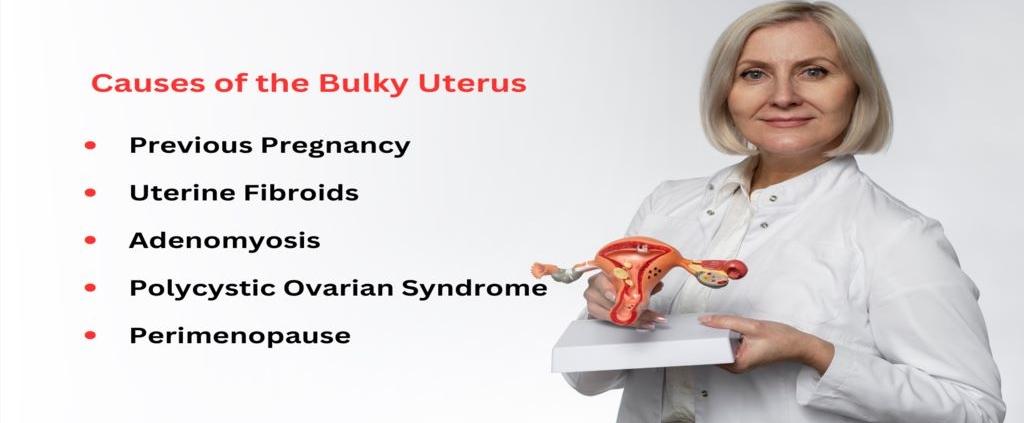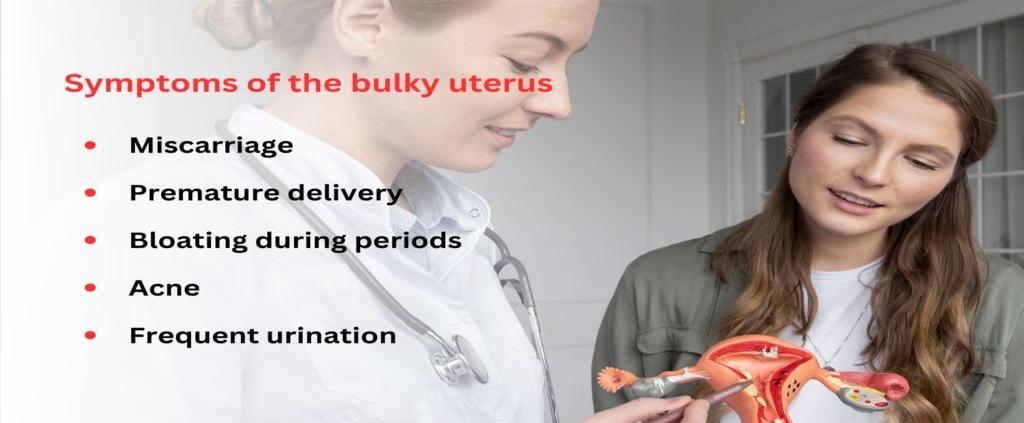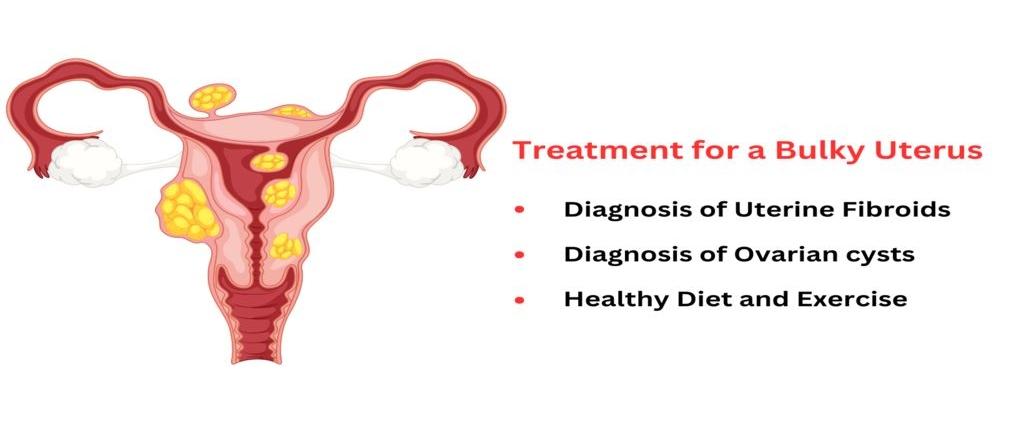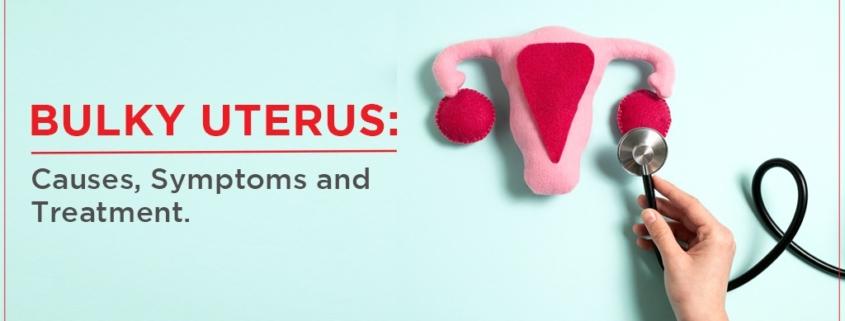Bulky Uterus – Causes, Symptoms and Treatment
Sometimes vaginal ultrasounds or internal sonography reports bulky uterus. You may be someone who has never come across the term bulky uterus. And it’s completely understandable if this unknown term, the bulky uterus, makes you shiver with panic. Before you arrive at any disastrous conclusions, let Imprimis IVF, The best IVF centre in Srinagar, walk you through the ins and outs of a bulky uterus.
What is a Bulky Uterus?
The uterus or womb is around the size of your clenched fist. You may also compare the size of your uterus with a small apple or pear. On average, the uterus is about 7-8 centimetres long, 4 centimetres broad, and 3 centimetres thick. Slight variations in these measurements do occur from woman to woman.
If your uterus is larger than the average size of 7cm×4cm×3cm (around 3-4 inches by 2-2.5 inches) due to some medical reasons or abnormalities, it is referred to as a bulky uterus.
It is a common misconception that a bulky uterus is always associated with infertility treatment or any other abnormality/disease. However, data shows that uterus-related problems comprise only 3-5% of infertility issues.
To better understand, let’s get down to bulky uterus causes.
Causes of the Bulky Uterus:-

Previous Pregnancy-:
During pregnancy, the uterus naturally gets enlarged as the baby grows. The apple-sized uterus attains the size of a watermelon with the development of the fetus. After the baby’s delivery, the uterus tries to regain its standard size. However, sometimes, it is unable to recover its original size fully. IVF Doctors have witnessed an increase of 1-2 inches in the uterus size after pregnancy.
For instance, if the size of your uterus before pregnancy was 7 centimetres. After delivery, your uterus’s size may be between 8-10 centimetres.
This increase is also reported as a bulky uterus if you undergo internal sonography.
But this increase in the size or bulky uterus in pregnancy is standard and is not a matter of concern.
If your uterus is about 12 centimetres long, it’s completely normal. However, if the uterus size is more than that, it is categorized as a bulky uterus that may warrant a medical checkup.
Apart from a history of childbirth, a woman may have a bulky uterus due to the following reasons-:
Uterine Fibroids-:
A bulky uterus with fibroid is quite prevalent among women in their childbearing age. Fibroids are witnessed in about 20% of childbearing women.
Uterine fibroids are noncancerous tumours in the form of lumps or growths found along the uterine lining and in the uterine cavity.
These noncancerous fibroids vary in size. Small uterine fibroids may be asymptomatic. At the same time, the larger fibroids, which weigh several pounds, may enlarge the uterus.
Uterine fibroids may be hereditary. A woman has two sex or steroid hormones, namely estrogen and Progesterone. The condition of uterine fibroids is majorly caused due to the imbalance of the hormones mentioned above.
Adenomyosis-
The uterus is coated by endometrial tissue. This uterine lining, or the endometrial tissue, is responsible for menstruation. Normally, this endometrial tissue lines the uterus. But due to certain factors, sometimes this tissue may grow into the uterus wall.
Adenomyosis is a noncancerous condition in which the uterine lining attaches itself to the muscular uterine wall. As a result, the tissues thicken, leading to the uterus’s expansion, known as a bulky uterus.
Research shows that 1 in 10 women of reproductive age is affected by Adenomyosis. It can enlarge the uterus up to three times its original size. The root cause of Adenomyosis is still undetected. However, doctors have concluded that the risk of Adenomyosis is higher in women who have had any uterine surgery. Also, Adenomyosis may be hereditary. Ageing also contributes to this noncancerous condition.
These two are the most common causes of a bulky or enlarged uterus. However, other factors also may contribute to a bulky uterus. Let’s dive into these bulky uterus causes.
Polycystic Ovarian Syndrome-:
The ovaries produce estrogen and progesterone. But in some cases, the ovaries produce an excess of male hormones and androgens. Polycystic Ovarian Syndrome, or PCOS, is a medical condition caused by hormonal imbalance due to the production of androgens that results in the shedding of the endometrial lining and disrupts a regular menstrual cycle.
PCOS is a common factor that contributes to infertility in women as it disrupts menstruation and results in the formation of cysts. PCOS may also lead to an enlarged/bulky uterus.
Perimenopause-:
Menopause and Perimenopause are two different terms. Perimenopause is that stage of a woman’s life before menopause strikes.
Perimenopause or menopausal transition occurs with reproductive ageing when the levels of estrogen and other hormones fluctuate. These hormonal fluctuations may result in a bulky uterus.
Reports witness that the uterus gains its original size once a woman hits menopause. But in some cases, it may be unable to do so and warrant a diagnosis.
- Ovarian Cysts – The fluid-filled sac in or on the ovaries is termed an ovarian cyst. These are normal during pregnancy and go unnoticed. However, in some instances, ovarian cysts may lead to reproductive complications such as abnormal enlargement of the uterus.
- Endometrial Cancer – Uterus cancer leads to the development of tumours. These tumours with varying sizes are witnessed to be one of the factors that lead to uterine enlargement. The most common uterine cancer is endometrial cancer which may also spread to other parts of the vagina.
In addition to endometrial cancer, cancer in other pelvic regions, such as the cervix, can lead to a bulky uterus.
Problems in conceiving are witnessed when a bulky uterus is backed with the right symptoms. Instead of panicking about it, seek medical guidance from a trusted IVF expert.
Infertility can only be confirmed after running a series of medical tests.
Now that you have skimmed through the possible causes of a bulky uterus, it’s essential to know its associated symptoms.
Symptoms of the bulky uterus:-

Many cases of the bulky uterus are asymptomatic. But some symptoms are so evident that it might become an uphill task to not panic about your reproductive health.
Bulky uterus symptoms are stated as follows:
- Heavy bleeding with blood clots during the menstrual cycle (Menorrhagia)
- Prolonged and irregular bleeding
- Severe cramps before, during, or after periods
- Intolerable pain during sexual intercourse
- Miscarriage
- Premature delivery
- Bloating during periods
- Pain in and around the lower abdomen, legs, lower back, and pelvis
- Swelling of the abdominal region
- Visible Anaemic symptoms due to heavy bleeding
- Breast tenderness
- Excessive hair growth, especially around the sexual organs
- Acne
- Frequent constipation and gas
- Frequent urination
- Paleness and weakness in the body
- Abnormal weight gain
- Accumulation of fat around the belly
If you encounter the symptoms mentioned above daily, don’t disregard them. Its symptoms indicate that you must consult a doctor. Early detection of vaginal abnormalities can help avoid serious problems like infertility.
It is advised that a woman of childbearing age undergo yearly vaginal examinations at a trusted clinic like Imprimis IVF, Srinagar, the best IVF centre in Srinagar.
Treatment of Bulky Uterus:-

A bulky uterus may or may not warrant a diagnosis. The treatment revolves around the severity of the condition. Vaginal ultrasounds and imaging tests are conducted and gauged under the supervision of an experienced IVF expert.
Diagnosis of Uterine Fibroids:-
The treatment option is decided based on the fibroids’ number, location, and size. These are detected with the help of a pelvic examination and abdominal ultrasound. It is followed by transvaginal ultrasound (TVS).
Certain medications are given to regulate hormonal levels and alleviate the pain during menstruation.
Intrauterine Device (IUD) is inserted to help regulate heavy bleeding and pain.
Suppose the problem is a bulky uterus with multiple fibroids or a large fibroid, which can lead to further complications. In that case, medical experts opt for the following endoscopic surgeries:
- Hysterectomy (surgery to remove the uterus)
- Myomectomy (removal of fibroids through surgery)
Diagnosis of Adenomyosis-:
Detection of the root cause and diagnosis of Adenomyosis is difficult to confirm. Proper tests such as MRI, transvaginal ultrasounds, and endometrial biopsy are conducted to verify Adenomyosis.
Surgical treatment is only recommended in severe conditions which may deteriorate the chances of conceiving or are life-threatening. Several therapies that are used to control Adenomyosis are stated below:
- Anti-inflammatory medicines
- Treatments to stabilize the hormones
- Uterine artery embolization
- Endometrial ablation
- Ultrasound surgery
Diagnosis of Ovarian cysts-:
A series of infertility tests, namely a blood test, pelvic ultrasound, and a pregnancy test, is conducted. Depending on the condition of the woman, birth control pills are prescribed. In cases of extreme complexity, surgical removal of ovarian cysts is performed.
Healthy Diet and Exercise-:
A healthy and balanced IVF diet chart can help cure any medical condition, and a bulky uterus is no exception. A diet loaded with fresh and raw fruits with green leafy vegetables will help manage the symptoms of a bulky uterus. Refrain from eating processed foods that contain excessive sugar and salt.
Proper exercise, such as yoga asanas, can help alleviate the pain during menstruation and improve the quality of life.
Conclusion
The bulky uterus is a household term these days. After finding out that a woman has a bulky uterus, she starts to worry about all sorts of possible medical issues. But in certain situations, such as a mild bulky uterus, it may not warrant immediate medical attention. However, if you are anxious about the complications it would cause in conceiving or any other medical ailment, please visit an IVF expert. No article or video can replace an experienced doctor. Have a nice day!






